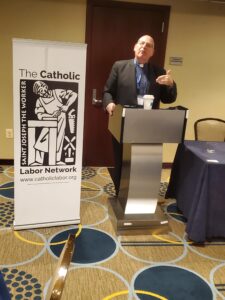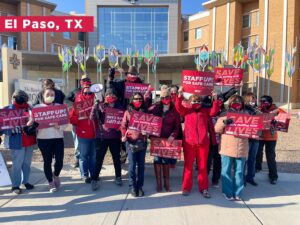Lawrence Cafeteria Workers Seek Fair Treatment
Courtesy of Catholic Labor Network member Jeremy DaCruz
In the City of Lawrence, Massachusetts, a city famous for its labor struggles, cafeteria workers receive wages barely above the state minimum wage. Over 100 years ago, immigrant women fought for higher wages and better working conditions. Now, the mostly immigrant women who make sure that the students of Lawrence, Massachusetts are well fed find themselves facing rising inflation, a crippling workload, and low wages.
During their last wage negotiation, the Lawrence Public Schools Cafeteria Workers (SEIU Local 3) picketed outside the School District office and won historic raises. However, given that their wages started from such a low point, they still struggle to make ends meet. Coupled with the fact that staffing ratios are still below their pre-pandemic levels, the Cafeteria Workers feel abused and disrespected.
When the Cafeteria Workers discovered that the Lunch Aides at the smaller City of Lawrence Public Schools recently negotiated a stipend for maintaining ServeSafe certification, the Cafeteria Workers asked the district to extend the same stipend to them as they must maintain the same certification and do essentially the same work. The School District has, so far, refused. In response, the Cafeteria Workers have organized a petition and asked community members for their support.
Catholic Social Teaching states that “[t]he provision of wages and other benefits sufficient to support a family in dignity is a basic necessity to prevent this exploitation of workers.” (Economic Justice for All, 103) The Cafeteria Workers ask that Lawrence Public Schools recognize this “basic necessity” and pay the Cafeteria Workers fairly, starting with the ServeSafe Certification stipend.
If you want to express your support for the Cafeteria Workers, please send an email to the Interim Superintendent Juan Rodriguez ([email protected]) asking that the ServeSafe stipend be extended to the Cafeteria Workers.


